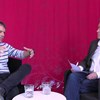revisiting
Revisiting the Cavity-method Threshold for Random 3-SAT
Journal Version Physical Review E 99 Abstract A detailed Monte Carlo study of the satisfiability threshold for random 3-SAT has been undertaken. In combination with a monotonicity assumption we find tha
What's (not) underpinning ambivalent sexism?: Revisiting the roles of ideology, religiosity, personality, demographics, and men's facial hair in explaining hostile and benevolent sexism
Personality and Individual Differences, Volume: 122, pp. 29-37. doi.org/10.1016/j.paid.2017.10.001 Abstract Ambivalent sexism is a two-dimensional framework that assesses sexist and misogynous attitudes
Resisting assimilation – ethnic boundary maintenance among Jews in Sweden
in: Distinktion: Journal of Social TheoryAbstractThis article evaluates Andreas Wimmer’s theory of ethnic boundary making by applying it to the maintenance of Jewish ethnic identification in Sweden, a

Is social progress around the corner? Insights from IPSP with Marc Fleurbaey
Marc Fleurbaey presents some of the insights from the International Panel on Social Progress while visiting the Institute for Futures Studies in Stockholm, September 2016. For more information abou

The role of elite corruption with Janine Wedel
The Role of Elite Corruption in Today’s Illiberalism: Trump as “Trickster,” Why Trumpism is No Accident, and the Corruption Coming Now. This is Janine Wedel's inauguration lecture as a Kerstin Hesselg
Belief Revision for Growing Awareness
Mind 130(520), 2021 Abstract The Bayesian maxim for rational learning could be described asconservative changefrom one probabilistic belief orcredencefunction to another in response to new information. ). But can this conservative-change maxim be extended to revising one’s credences in response to entertaining propositions or concepts of which one was previously unaware? The economists,) make a proposal in this spirit. Philosophers have adopted effectively the same rule: revision in response to growing awareness should not affect the relative probabilities of propositions in one’s ‘old’ epistemic state. The rule is compelling, but only under the assumptions that its advocates introduce. It is not a general requirement of rationality, or so we argue. We provide informal counterexamples. And we show that, when awareness grows, the boundary between one’s ‘old’ and ‘new’ epistemic commitments is blurred. Accordingly, there is no general notion of conservative change in this setting.

Dean Spears
I am Assistant Professor of Economics at the University of Texas at Austin and Executive Director at Research Institute for Compassionate Economics. I am also visiting economist at Indian Statistical

Solidarity in diverse societies - interview with Will Kymlicka
Will Kymlicka, researcher of political philosophy, came to visit the Institute for Futures Studies in Stockholm in April 2016, thanks to funding from The Swedish Foundation for Humanities and Social S
Axel Gosseries
I am a philosopher and law scholar, visiting professor at the Institute for Future Studies. I am a Maitre de recherches at the Fonds de la Recherche Scientifique (Brussels) and a professeur extraordin

Olle Hammar
I am a researcher at the Institute for Futures Studies and an assistant professor in economics at Linnaeus University. My research focuses on issues related to economic inequality, migration and cultu, at Uppsala University in 2021. I have also been a postdoc at the Research Institute of Industrial Economics and a visiting researcher at Columbia University and the University of California, Berkeley.








